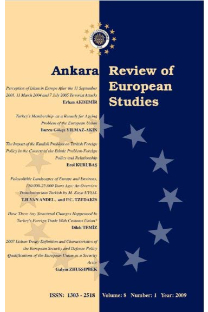Avrupa Birliği ve Ekonomik Parasal Birlikten Ayrılmanın Lizbon Antlaşması Çerçevesinde Değerlendirilmesi
Son dönemde Avrupa Birliği AB ve Ekonomik ve Parasal Birlik’ten EPB ayrılma, tek taraflı çekilme ve ihraç edilme gibi konular AB resmi çevrelerinde ve kamuoyunda daha ciddi bir şekilde ele alınmaya başlanmıştır. 1 Aralık 2009 tarihinde yürürlüğe giren Lizbon Antlaşması ile tek taraflı çekilmenin AB Müktesebatının bir parçası haline gelmiş olması ve 2007-09 küresel mali krizi sonrasında EPB’de bir borç krizinin yaşanması bu konulara ilginin artmasında etkili olmuştur. Lizbon Antlaşması sonrasında AB Antlaşmasının 50. maddesinde düzenlenen tek taraflı çekilme hakkı çerçevesinde AB’den ve EPB’den kopmaların yaşanması durumunda ilginç birtakım senaryoların ortaya çıkması mümkün görünmektedir. Birinci senaryoya göre, AB’den çekilmeye karar veren bir üye devlet Konsey ile anlaşma yoluna giderek en azından bir süreliğine EPB’de kalmak istediğini talep edebilir ve böylece, en azından teoride AB’den ayrılması, ancak Avro kullanmaya devam etmesi mümkün görünmektedir. İkinci bir senaryo da taraf devletlerle yapılan bir anlaşma çerçevesinde üye devletin EPB’den çıkması, ancak AB üyesi olarak kalmayı sürdürmesinin mevcut hukuksal düzenlemeler altında mümkün olmasıdır. Lizbon Antlaşması ile getirilen tek taraflı çekilme hakkı AB yetkililerinin konuya ilişkin görüşlerine bir parça açıklık getirmiştir; ancak, özellikle EPB açısından veya bir başka deyişle Yunanistan’ın mevcut durumda EPB’den çekilmesi hakkında halen yeterli bir netlik kazandıramamıştır. Bu çalışmada yapılan hukuksal analiz sonucunda, AB Antlaşmasının 50. maddesine göre bir üye devlet bir yandan AB’den ayrılırken, EPB’de kalmayı ve avro kullanmayı sürdürmeyi müzakere edebilmekte; diğer yandan da, EPB’den ve avro kullanmaktan vazgeçip, AB’de kalmayı anlaşma yoluna giderek tercih edebilmektedir. Ancak, Lizbon Antlaşması ile hukuksal yönden mümkün olan bu senaryoların siyasi yönden müzakere edilebilir gerçekçi senaryolar olmadığı düşünülmektedir
Anahtar Kelimeler:
EPB, Lizbon Antlaşması, Avro, Çekilme, İhraç, Uluslararası Hukuk
There has been two major developments today showing that withdrawal and expulsion from the European Union EU and Economic and Monetary Union EMU is being more seriously elaborated on in EU official circles. First one of these developments is the withdrawal right from the EU which has become a part of the Acquis Communautaire with the new Lisbon Treaty; the second development is EMU facing a serious economic crisis due to a possible Greek default on its sovereign debt after being hit by the 2008 global financial crisis. According to the withdrawal right outlined in article 50 of the Consolidated version of the Lisbon Treaty it is possible that potential bizzare and different scenarios are possible. The first scenario implies that a member state decided to withdraw from the EU, might opt for an agreement where it prefers to stay at least for a while in the EMU. Hereby it seems feasible that a withdrawing state from the EU can theoretically continue to use euro. The second scenario implies that according to a agreement in line with the Treaty, a member state can withdraw from EMU and continue to be a part of the EU under current legal regulations. Within this context, Lisbon Treaty has clarified inadequately the opinion of the EU officials on a member state withdrawing from the EU and has remained obscure on withdrawal from the EMU. According to the legal analysis carried out in this paper, article 50 of the Consolidated version of the Lisbon Treaty suggests that a member state is able to prefer to stay in the EMU, while it withdraws from the EU and also it suggests that it is possible to opt for a witdrawal from the EMU and continue to be a member of the EU. One of the conclusions of the paper is that a more clear strategy for withdrawal and expulsion might be beneficial for the EU integration process if used conveniently. In the end, even if the Lisbon Treaty makes such scenarios legally feasible, at least for now, it is considered that this kind of agreements are not realistic and negotiable in terms of EU politics
Keywords:
Key Words: EMU, Lisbon Treaty, Euro, Withdrawal, Expulsion, International Law,
___
- Phoebus Athanassiou, “Withdrawal and Expulsion From The EU and EMU: Some Reflections”. ECB Legal Working Paper, 10, 2009
- BBC News, “Leaving the Euro: How Would it work?”, http://www.bbc.co.uk/news/business-11830532, 25 Kasım 2010.
- Mario Blejer, Eduardo Levy-Yeyati, “Leaving the Euro: What’s in the Box?, Vox.EU, 21 Temmuz 2010.
- Willem Buiter ve Ebrahim Rahbari, “Rising Risks of Greek Euro Area Exit”, Citi Global Economics View, 6 Şubat 2012.
- Consolidated Versions of Treaty on European Union and the Treaty on The Functioning of the European Union, 2008/C 115/01.
- Larry Eaker, “The Debt Crisis and the Legality of Leaving the Eurozone”, http://jurist.org/forum/2011/09/larry-eaker-eurozone-exit.php
- Jurist-Forum, 22 Eylül 2011.
- Mathiass Herdegen, “Monetary Union as a Permanent Community Based on The Rule of Law”. EMU Watch, Deutsche Bank Research, 1998
- HSBC, “The Eurozone Crisis Explained”, 19 Ekim 2011.
- Wolfgang Munchau, “Eurozone Meltdown: How The Unthinkable Might Happen”. EVRO Intelligence, Briefing Note, 1, 2009
- Charles Proctor, “The Future of The Euro–What Happens If A Member State Leaves?”. Journal of Financial Transaction, 19, 2007
- Reuters, “Greece could not exit euro without leaving EU”, 3 Kasım 2011. http://www.reuters.com/article/2011/11/03/us-greece-eu-eurozone- idUSTRE7A23TY20111103
- Hall S. Scott, “When The Euro Falls Apart”. International Finance, 1:2, 1998
- Gilles Thieffry, “Not So Unthinkable-The Break-up of European Monetary Union”, International Financial Law Review, 2005
- AB Komisyonu, www.ec.europe.eu AMB, www.ecb.int
- ISSN: 1303-2518
- Yayın Aralığı: Yılda 2 Sayı
- Başlangıç: 2001
- Yayıncı: Ankara Üniversitesi Avrupa Toplulukları Araştırma ve Uygulama Merkezi
Sayıdaki Diğer Makaleler
AB’nin Normatif Kapasite Sorunu, Akdeniz için Birlik ve Türkiye
Yeni Zamanlar” ve Yeni Liderlik Anlayışı
Avrupa Birliği’nin Terörizmle Mücadele Stratejisi: Yeni Bir Bütünleşme Alanı Mı?
“Yeni zamanlar” ve yeni liderlik anlayışı
A BRIEF OVERVIEW ON EU INSTITUTIONAL CHANGE FROM FOUNDATION TO LISBON
